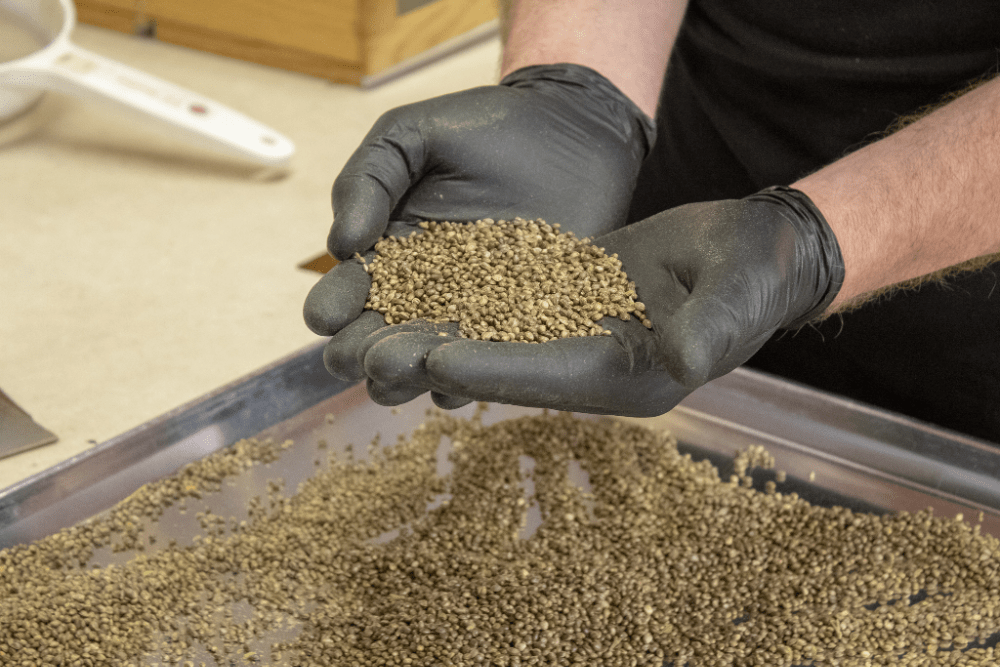Farmers who grow traditional crops like corn and wheat typically rely on certified seeds to ensure they’re buying genetics that meet accepted standards for germination rates and purity.
Since the reintroduction of hemp in the U.S. is so recent, there is not yet a national standard for certifying feminized hemp seeds. There are a handful of smaller certification programs that are beginning to address the industry’s concerns about hemp seed quality on a state-by-state basis, but currently the definition of “certified hemp seed” is new and vague. Very few hemp genetics companies specializing in high-cannabinoid, feminized strains have begun the process of obtaining any kind of certification.
Because farmers can’t count on uniform, nationwide standards for hemp seed certification, they may end up purchasing poor-quality seeds – which can have disastrous consequences. Farmers who purchase seeds from questionable sources risk accidentally buying non-feminized seeds, having crops perform poorly in the field, or growing non-compliant crops that have to be destroyed.
But there are organizations who are working together to establish industry-wide accountability by standardizing the quality of hemp genetics worldwide.
Oregon currently has some of the strongest testing protocols in the country for seed certification. High Grade Hemp Seed and iHEMPx, among others on the Certification Committee, have been integral in establishing the rules for certification hand-in-hand with the team at OSU.
Oregon State’s certification program offers a hemp seed certification that will give farmers peace of mind when they’re buying seeds, because they will have a guarantee that the seeds and starts being purchased are true to strain, with proven feminization and germination rates, and of the highest quality.
Matterhorn CBG is the first hemp strain under production by iHEMPx that is being certified under OSU’s new Oregon Seed Certification Service. Matterhorn seed produced by iHEMPx has received its Experimental Tag while in the process of being certified, and we look forward to soon receiving Full Certification and a “Blue Tag.
The Current Seed Certification Landscape
American seed certification programs across the country are governed by The Association of Official Seed Certifying Agencies (AOSCA), an organization dedicated to assisting in the identification, production, distribution, and promotion of certified classes of seed.
The Association of Official Seed Certifying Agencies sets minimum standards for genetic purity and identity, and the organization recommends minimum standards for seed quality for the various classes of certified seeds.
Now, with programs like Oregon State’s Seed Certification Service, hemp is being incorporated into the same certification process used by traditional seed producers.
Currently, the Oregon Seed Certification program certifies approximately 250,000 acres of seed crops across 50 different crop species on an annual basis – including hemp. Their testing process ensures varietal purity and seed quality through field inspections, laboratory evaluations, and record keeping.
There are 2,500 traditional seed growers and 382 seed warehouses participating in OSU’s program. iHEMPx is pursuing certification for all hemp strains under production, and currently has the only approved Seed Cleaning Warehouse for feminized hemp seed in Oregon.
The Oregon State Seed Certification program has its own standards (all of which are equal to or above required AOSCA standards) and Oregon State administers the testing and issues certification tags.
A Peek Behind the Scenes of the Certification Process
The Oregon State testing process is quite vigorous, and each field is assigned 2 to 3 inspectors from the field inspection group. Each field has to pass inspection, and there are requirements for greenhouse sanitation, isolation, and crop rotation to ensure that each seed lot is true to the variety. During iHEMPx’s current certification process, OSU is able to visit our farms and greenhouses at any time with no restrictions.
Oregon State maintains the chain of custody of the seed sample from the warehouse and tests each seed lot for purity, feminization, and germination. They also fully inspect each operation to ensure that equipment, recordkeeping, and processes comply with the Federal Seed Act.
“Oregon is known for quality seed production and has leveraged that knowledge in the newly-established hemp seed certification process,” shared Rachel Hankins, a Seed Certification Specialist and Hemp Program Coordinator at Oregon Seed Certification Service. “Our standards are set higher than the national requirements to ensure that Oregon-certified seed is of the highest quality.”
A Peek Behind the Scenes of the Certification Process
Here at iHEMPx, we are proud to partner with Oregon State University to provide confidence and clarity for farmers in the midst of an onslaught of questionable genetics and inflated claims from seed suppliers.
Oregon State has some of the strongest testing protocols in the country for seed certification, and their new program will provide much-needed protection for hemp farmers as they’re making choices about their 2020 growing season.
To connect with iHEMPx, or to inquire about Matterhorn CBG hemp seeds, visit www.ihempx.com or call #877-FARM-HEMP (327-6436). To learn more about Oregon State’s seed certification program, visit their website.
About iHEMPx
iHEMPx serves the hemp industry as a trusted, vetted, and reliable supply chain partner, from seed to finished product. We exclusively produce and distribute High Grade Hemp Seed genetics, the most genetically superior seeds available, and provide support and education to help farmers turn those seeds into profitable crops.
Take a look at this: The Ultimate Guide to Tadalafil: Benefits, Uses, Dosage & Expert Insights
For more information on iHEMPx, or to inquire about the availability of Colorado seeds, starts, clones, and smokable flower call #877-FARM-HEMP (327-6436) or click here to contact our sales team.
